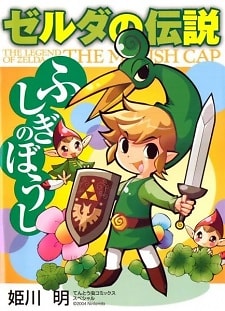Of all the Legend of Zelda games I've played, The Minish Cap is definitely one of them. It's hardly a bad game; just a forgettable one. What makes this weird is that the final fight with Vaati left such an
impression on me I shoehorned him into a D&D campaign as a boss. The rest of the game is this big
nebulous blob that; if I revisited it I'd love it but forget about it soon after. This overall feeling of
apathy also extends to the manga adaption.
The story follows the game's plot in a condensed format. Seeing as having chapters of Link wandering around a dungeon with no clue how to proceed would be rather boring and waste what little page count we have, instead each dungeon is treated as an action scene; barring the third temple, which goes into story about a fairy who sings for days then dies. It’s beautifully drawn, like most of the book's art, and serves as a nice transition into a decidedly more serious second half. The Picori are quite a bit more involved in the action here which I feel ties better into their love of humanity. Link is the first human they've been able to communicate with in a long time so of course they'd really love helping and being involved with him. This does however become the root of some of the nitpicks.
Near the middle of the story Link is given a magical feather by the Picori elder, Libari, and at first it's a nice little way to keep Link on the right path without feeling like he's being railroaded. Near the end this feather might as well kill Vaati by itself for all the goofy crap it pulls from making a perfect map of an area to becoming a Roc's cape. Mind you this things back story is that Libari won it off a regular Cucco by kicking its can. The other issue that bugs me is Link's little character arc is poorly defined. Near the end he berates Vaati for using the power of others to strengthening his own and Link relies on his own power. There is just one problem with that: Link is using things given to him by the Picori. There is nothing wrong with getting help from friends but give credit where credit is due and don't act like you did it all. I would chalk it up to poor translation if the rest of the manga wasn't translated well but it isn't so I won't.
I do know that some Zelda fans to take these games more serious than I do and tend to prefer a more
mature experience from the franchise; the fact that this is a more light hearted action comedy might not sit well with some. However I've always seen the franchise as one not afraid to laugh at itself and I can live with the more humorous moments of the book. The character are the right mix of funny and serious so that they still feel like Legend of Zelda characters. Also I do love that Kinstones are
implemented in such a clunky manner that it borders on comedy though it's a nice call back to the
game's actual plot use of them so I can forgive it.
The manga adaptation of The Minish Cap is a fun little romp that ultimately doesn't leave a great deal of impact just like what it's based on. The action is fun and it has possibly the cutest version of the Gleerok I've ever seen. It's worth a read once for the genuinely funny comedy but nothing really worth writing home about.
Till Next Time: Stay Positive

No comments:
Post a Comment